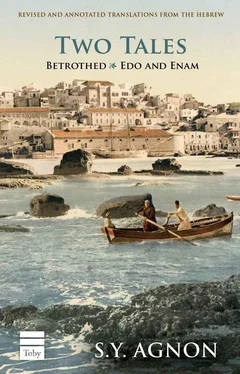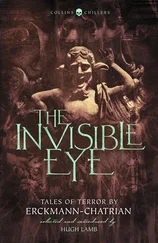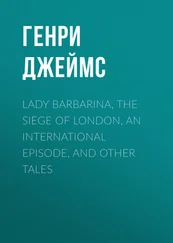A good while passed. Rechnitz stood motionless. What has happened? he wondered. By now they should have returned, but they are not here yet. He looked around him. Heaven and earth, land and sea, were all confounded, and the waves of the sea were raised on high, the waves crashed like thunder, and the sound of the girls’ running feet could not be heard. Why haven’t they come back? he asked himself. The sea grew even vaster, its waves rubbed against the dry land, but there was no sound of the girls’ feet, no sight of the girls themselves. Where had they gone, where had they vanished?
Rechnitz hung the wreath over his arm and began to run. He ran until he reached the place and found them all there, as well as one who had not been with them at the start. She was in her nightgown, like a maiden suddenly alarmed in her sleep. Silent and fearful stood the girls, and with them stood Shoshanah Ehrlich, who had outstripped them all in the race. Neither Leah nor Rachel nor Asnat nor Raya nor Mira nor Tamara had seen her running, yet each of them had been aware in the course of the race that someone was ahead of her, without knowing this someone as Shoshanah Ehrlich, Jacob’s friend, who for many days and weeks had been asleep, never rising from her bed. With fear in their souls they forgot the garland and their agreement with Jacob. And Jacob, too, forgot all this as he stood before Shoshanah.
Suddenly there was a voice calling him by name, a voice that came, as it were, from beneath Shoshanah’s eyelashes. Jacob shut his eyes and replied in a whisper, “Shoshanah, are you here?”
Shoshanah’s eyelashes signaled assent. She put out her hands, took the crown from Jacob’s arm and placed it on her head.
Here, for the time being, we have brought to an end our account of the affairs of Jacob Rechnitz and Shoshanah Ehrlich. These are the same Shoshanah and Jacob who were betrothed to one another through a solemn vow. Because of it, we have called this whole account “Betrothed,” though at first we had thought to call it “The Seven Maidens.”
Annotations to “Betrothed”
3. Jaffa / An ancient port city, and main center of the Second Aliyah and Jewish settlement in the early 20 th century; today the southernmost part of the modern municipality of Tel Aviv-Jaffa. Agnon lived in Jaffa when he first arrived in the Land of Israel in 1908, roughly the same time as the setting of this story.
3. Daily cover / Cf. Deuteronomy 33:12.
3. Ishmaelites / Muslims.
3. Jacob Rechnitz / As with many of Agnon’s characters, it is likely that the author has encoded a form of “midrash” into our protagonist’s name. Jacob is reminiscent of the Biblical forefather, whose name ( Ya’akov in Hebrew) carries a meaning of “to circumvent” or to be “crooked” (Genesis 25:26, but also 27:36). Recall that the Biblical Jacob was manipulated to marry a woman against his will (Genesis 29), as is that other scholar in Agnon’s writing, Akavia Mazal — whose first name is etymologically identical with Ya’akov/Jacob — in “In the Prime of her Life” in Two Scholars Who Were in Our Town and Other Novellas (Toby Press, 2014). Rechnitz is a town in Austrian Burgenland, near the Hungarian border, but may evoke “recht” meaning right or proper. If so, Jacob Rechnitz’s name embodies the coincidence of opposites: a crooked uprightness, and may recall Agnon’s early novella of misaligned love, “And the Crooked Shall be Made Straight” ( VeHaya He’Akov LeMishor , cf. Isaiah 40:4), forthcoming in translation from Toby Press. Avraham Holtz suggests that Rechnitz might be a Hebrew anagram for nitzrakh — meaning “needy”.

Ze’ev Tiomkin
4. Fever of land speculation / Wave of land speculation in and around 1891, coordinated by Hovevei Zion leader Ze’ev (Vladimir) Tiomkin (1861–1927), leading to the Ottoman Government forbidding land sales in Palestine to Jews, resulting in widespread bankruptcies.
4. Turk / The Ottoman Turks ruled the Land of Israel from 1517 to 1917.
4. Council of the Lovers of Zion in Odessa / The Hovevei Zion (Lovers of Zion) were European Zionist groups, founded in the 1880s to promote Jewish immigration and agricultural settlement in Palestine. The Odessa Committee was the branch of the movement in Russia, recognized as an official charity by the authorities.

HaShilo’ah
5. HaShilo’ah / Monthly Hebrew journal founded by Asher Ginsberg (Ahad Ha’Am) in 1896, covering Jewish life, literature and culture.
5. Razsvyet / “The Dawn”; Russian-language Zionist weekly, published in St. Petersburg between 1907–10.

Caulerpa prolifera
6. My vineyard / Cf. Song of Songs 1:6.
6. Caulerpa / A genus of seaweeds in the family Caulerpaceae, the name means “creeping stem”.
6. Cryptogam / A plant that reproduces by spores, without flowers or seeds.
7. Hovered over the face of the waters / Cf. Genesis 1:2.
7. Ehrlich / German family name meaning “honest” or “honorable” or “upright”; cf. meaning of Jacob Rechnitz’s name, above.
8. Solemn vow / It is from this Hebrew phrase, shevu’at emunim , that the story takes its title; the English title “Betrothed” captures this partially in its etymology “to pledge troth”, to make a vow or oath of faithfulness.
9. Rose / The symbolism of the rose is lost in translation; in Hebrew a rose is shoshanah , the name of our story’s female protagonist.
10. Katharinenhof / A resort outside of Vienna.

Franz Joseph I
10. Emperor / Franz Joseph I (1830–1916), Emperor of the Austro-Hungarian Empire.
13. There is a time for all… / Ecclesiastes 3:1.
13. Great War / World War I.
14. Sappho / Greek lyric poetess from the island of Lesbos, c. 630–570 BCE.
14. Medea / In Greek mythology, Medea was the daughter of King Aeëtes of Colchis and granddaughter of the sun god Helios, and later wife to the hero Jason (of Argonaut fame). She is the central character in Euripides’s play Medea .
14. Yeshivas / Traditional Talmudic academies. (Many of the eastern European Jews who arrived in the Land of Israel during the early 20 th century left behind their traditional learning and strict religious lifestyle.)
14. Seven Planets / Classical heavenly bodies visible to the eye and known in the ancient world: Mercury, Venus, Mars, Jupiter and Saturn, together with the Sun and Moon; cf. Shabbat 156a for Talmudic astrology and mentions of these seven planets.
16. Intimate du / Conversations between Rechnitz and the Ehrlichs would have taken place in German, which differentiates between the informal du for second-person address and the more formal Sie .

Ahad Ha’am
21. Ahad Ha’Am / Pen-name of Asher Ginsberg (1856–1927), journalist, essayist, and preeminent Zionist thinker; founder of “cultural Zionism” aiming toward the establishment of a “Spiritual Center” as opposed to Herzl’s political Zionism. The pen-name Ahad Ha’Am (taken from Genesis 26:10) means “one of the people”.
Читать дальше

















